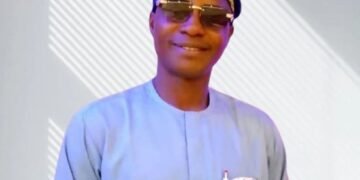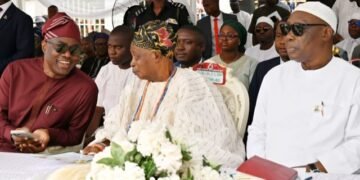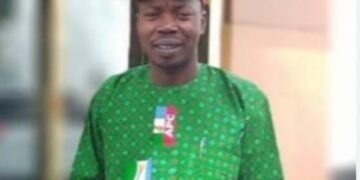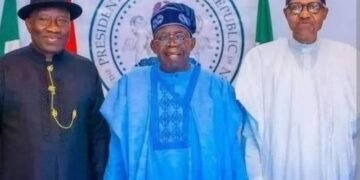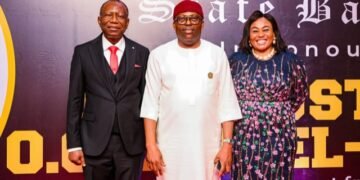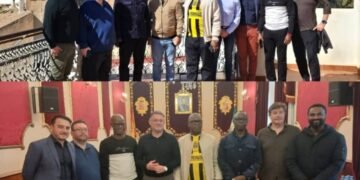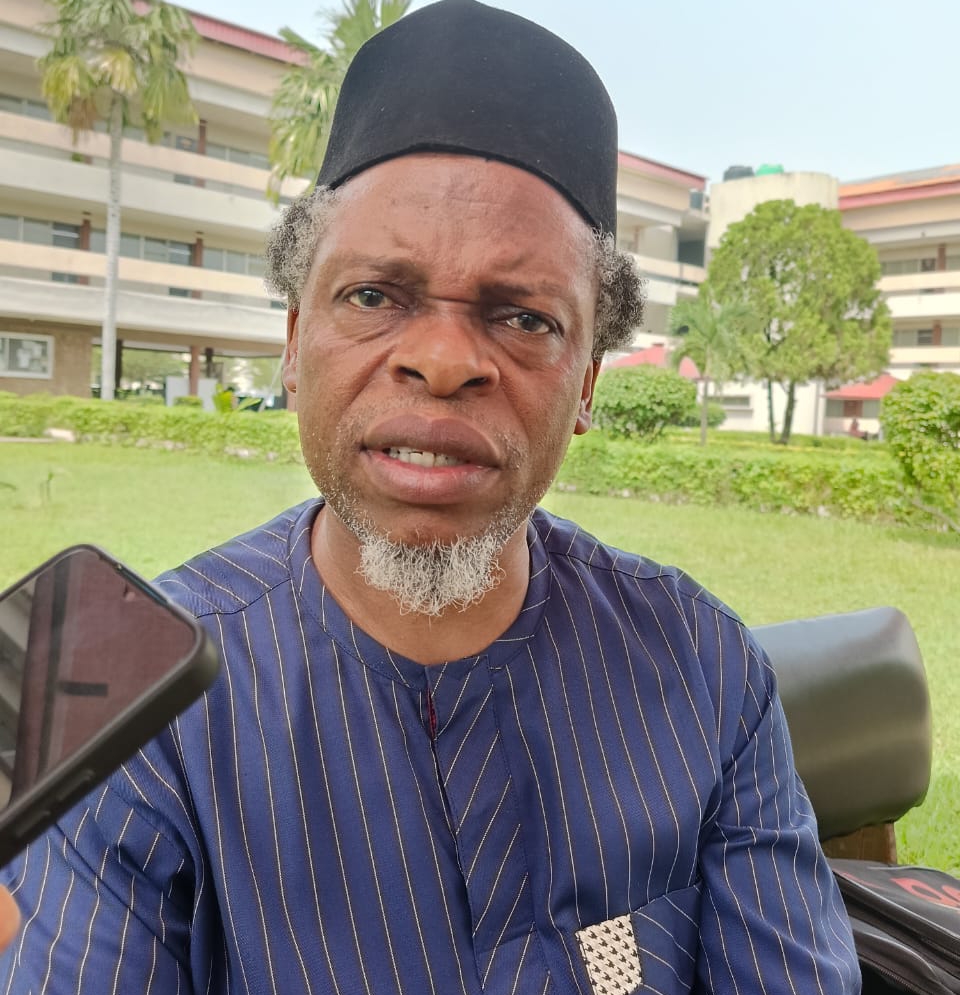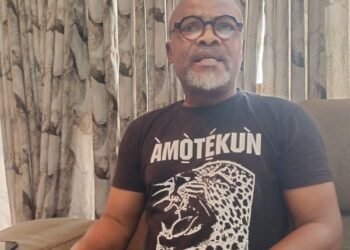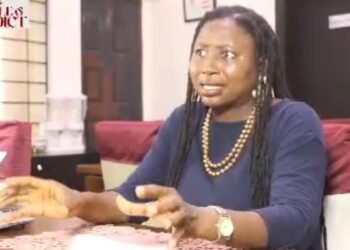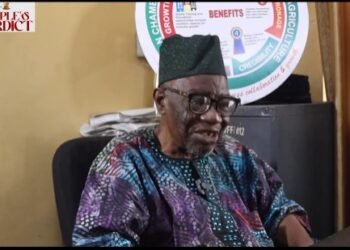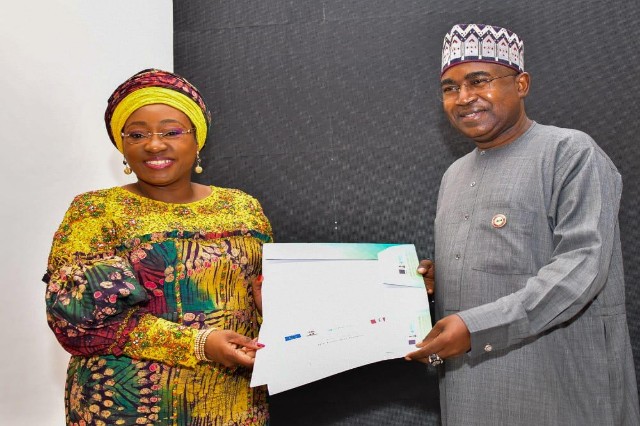Alhaji Farouk Sanni is a 1985 graduate of Accounting, University of Ife (now Obafemi Awolowo University), Ile-Ife. He got into the employment of United Bank for Africa in 1988 where retired as a Deputy General Manager in 2014. Armed with MSc. in International Management and other professional certificates, he was at University of Ibadan for a BSc. in Sociology where he recently emerged as the Best Graduating Student. He speaks exclusively to Newscoven.ng on his next line of action.
Why did you go for a first degree in Sociology programme at an old age and already with a Master’s Degree in International Management?
It is a long story, but I will try to summarise it. Back then, we had an uncle who actually had the figure of a semi-god; we couldn’t question his authority; whatever he says is law. He will just collect our ‘O’ Level certificates and assign different courses to us, at his own whims and caprices. When it got to my turn, he said I should go and read Accounting, just like that. Whether I had a passion for it or not was completely irrelevant and immaterial.
So, I wrote JAMB, entered the University of Ife, as it was then called, and graduated in 1985 with the likes of Ayeyemi Ademola, the former Group Managing Director of Ecobank.
Throughout the course of study, I was complaining. I had somebody who was very close to me, Kolade Ogedengbe. I will be complaining to him that I am not really flowing with the course. But because of the competitive nature -just ensure that you do it right -I went through the course; I did not like it but I graduated in 1985.
I joined UBA in 1988. There was one of my greatest supervisors, Sam Oniovosa, who also graduated from the University of Ife; he made a First Class in Economics. I was reporting to him then; he was the Head of Credit Risk Management. At that point in time, I was also reporting to the former Emir of Kano, Sanusi Lamido Sanusi.
One day, Sam Oniovosa asked me: “FKS, when did you qualify?” It did not even occur to me what he was talking about. So I asked him: “For what sir?” He said “By now you must have written the qualifying exams of the Institute of Chartered Accountants of Nigeria (ICAN)”. I told him I am not qualified. He said: “You must be a mad man”. My boss had a very hard tongue and he was intentional about it. He would hit you very hard for you to know the severity of the offence or crime that you have committed.
So, when I told him I was not qualified, Oniovosa said: “How would you not be qualified as a chartered accountant, if you graduated 1985, 14 years ago and this is 1999 and you are already producing accountants?” This was because I was working on a part-time basis then with Pass Your Exams (PYE), Ojuelegba, Lagos. That institution was then desperately looking for a lecturer for a newly-introduced course, Multi Disciplinary Case-study. And because of the nature of that course, it is not fixated, you would have to bring an accountant who is unconventional in nature out of his comfort; it is no longer a matter of debit the receiver, credit the giver. It will give you a case-study that would run from quantitative analysis to statistics, to management, to English and will then ask you questions. If you are rigid, you will not do well.
They were looking for somebody who could be able to do that. I presented myself, ran through the interview and they employed me. But they said “but you are not yet qualified”. I was there and, by God’s grace, I was able to produce fantastic results. So, since then, I have been looking for any opportunity to get out of the entanglement of Accounting.
What did you do to get out of the entanglement?
I did an MSc in International Management. I thought it was something that would give me the latitude to be able to express myself; not that somebody would tell me that 10 plus 2 is 12 and it cannot change. That is Double-entry Accounting Equation. You either take it or leave it; you cannot do anything about it -debit the receiver, credit the giver. That is the crux of the matter as far as Accounting is concerned.
So, I thought Management was about motivation, organisation, behaviour, etc. I went for a Masters in International Management, University of Liverpool, London. I produced a result of eight As; three A stars, five As from the university in 2012 or so. But then, I was not satisfied. A question kept coming to my mind: “Why do people behave the way they behave?” I have seen a lot in this life.
How would you describe yourself?
I have a duty to know myself. I think I have said one of my attributes. I am very liberal as far as religion and ethnicity are concerned. I don’t deal with you on the basis of your ethnicity or your religion. If you are worth being done anything for, I will go ahead. I consider merit first. I am Muslim, if you write a recruitment test in my organisation and a Muslim scores 42 and a Christian scores 70, there is no way on earth that I will go ahead and employ the Muslim. I will admit that Christian and we will agree on what the rules of engagement would be so that we will respect the spaces of each other.
I think I am also a bit kind to a fault. I actually want to see that as being weak because a lot of people capitalise on that. Even when I was in the industry, they will say ‘oh, is it Mallam Sanni? What would he do to you? Just go there, talk to him and beg him. That man will agree.’ That was the kind of the way I saw many people treating me: that once you talk to him, he will reason with you; he will empathise and he will let you go.
And when I try to behave otherwise and say ‘you think I cannot do tit-for-tat’ I don’t have the power to that. I will break down midway, even if I tell you that I will do it. What I then do is to put on garb of a very strong and tough personality. So, at times, I will shout and rake just to cover up.
Is the question, “why do people behave the way they behave?”, the main factor for your decision to do a degree in Sociology or just a leeway out of Accounting to find satisfaction?
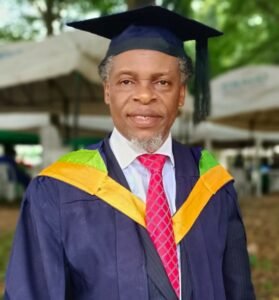
That question is multi-faceted. But the flagship of the reasons is to answer that question, “Why do people behave the way they behave?” By being able to answer that enquiry, I will become self-actualised; I will be fulfilled. And, by being fulfilled, I will also find it as a leeway out of the rigid nature of Accounting. So, it is a double-edged sword.
This brings me back to my former boss, Sam Oniovosa. When he asked me that question, I had this feeling that oga may not want to appreciate it, telling him that one uncle imposed something on you. I wanted to end that discussion. So, I told him that I cannot afford it. He said, “ehn ehn, you cannot finance your exams. Okay, follow me”. I followed him to his office.
When we got there, he said, “Can you tell me again what you told me earlier why you cannot write your ICAN”. I told him again that I cannot afford it. He said “okay, bring my briefcase”. I took his briefcase before him. Then Sam Oniovosa asked me again: “How much do you need?” Unfortunately, I cannot remember that figure again, but I made sure I gave him one very prohibitive figure that should be enough to just discourage him and let me go because I did not want to further that discussion. But my boss took out his checkbook and wrote out that figure and said “Take it. Go for that programme. Now you don’t have any excuse”.
I really did not have any choice again. I don’t know whether that is the second level of imposition, but positive this time around because I already knew what I was doing. My boss carried me along. At least, he knew that it was a job that should be completed.
That was how I registered for ICAN where I was lecturing. I wrote the exams and I passed and I qualified as a chartered accountant. 10 or 12 years later, I became a fellow of the Institute of Chartered Accountants of Nigeria (ICAN). I also did some other professional exams.
Did you find the fulfillment after studying as an undergraduate again?
Kindly allow me to meander: How was I able to start that journey, in the first instance? When I retired from UBA in 2014, I was already too eager to have a rest, when you look at the complex nature of Lagos life, added to the equally stressful life of a banker. I will need to leave my house at Awoyaya nothing later than 5am everyday and you have to struggle with the Danfo drivers until you get to Marina.
I was already craving for that rest. So, immediately I retired, I relocated to Ibadan. I did not think twice about it and I started resting, practically. Then, I just realised that some small illnesses started creeping in; backache today, neck pain tomorrow and I started visiting the hospital. This continued until one doctor, who has a human face, did not just examine me because I was even going through physiotherapy sessions, paying ₦5,000 per session.
But this doctor waited by and asked: “Can you tell us your career history?”, and I told him. He said “no wonder. I will not administer any further medication on you. You cannot live such a very busy life and all of a sudden you just slide into an absolute rest for that matter. Your body is finding it difficult to adjust to this new life. Please, get engaged and that kind of engagement cannot be on your own terms.”
So, this is another sub-reason for my going to UI to study Sociology. Otherwise, if it were to be on my own terms, I can always say please don’t come today, I am busy or I am going out. But how will you tell your lecturers, at UI in particular, “don’t come today or I cannot come to your class today or that your test, I want you to reschedule it?” You cannot do that, not in UI; you cannot practice it with any lecturer in UI. That is one of the reasons that made UI tough. And you know, also having the privilege of attending the University of Ife (now Obafemi Awolowo University), God of mercy, the two universities are two sides of the same coin. There is no way you can escape from an accident.
I came to UI one day to meet Professor AbdulAfeez Oladosu. I think he was then the Head of Department of Arabic and Islamic Studies. He is a brother, but I did not immediately know until I looked at him very carefully one day and I asked him, “Did you perchance have anybody who lived in Ilesa, Osun State in the early 70s?” And he said “yes, that must be my father.” “Wonderful. it was your father that thought me the first pages of the Quran,” I told him and that was how we embraced each other.
Professor Oladosu asked “what brought you here?” I answered him and he said, “Oh egbon, you will not stop troubling yourself. What is this now after retirement? A degree? You are not talking of a Ph.D”. But I told him to just support me. He now got one fantastic Muslim brother, Dr Owodunni, to assist me. And when I told him my enquiry, “why do people behave the way they behave?”, Dr Owodunni said “oh, please go to the Social Sciences. You are likely to find an answer there.”
Our first port of call was the Department of Psychology. When I got there, the moment I said what I want, a professor whose name I cannot remember now said “our emphasis in Psychology is on the individual. Please, try Sociology.” We got to Sociology, Professor Rasheed Okunola was the Head of Department then. Some other professors were also present in his office that day.
Dr Owodunni introduced me to them and they said “this baba is a natural sociologist. So, is it a Ph.D that you want to pursue?” I said no. They asked if it is a Master’s Degree. I said no. They were aghast and they asked “what do you want?” I told them Bachelor’s Degree. And they looked at one another and asked “after your retirement?” I said yes.
But do you know my thought? My thinking was that I could use my Accounting Degree certificate to gain a direct entrance admission so that I can spend three years, instead of four. But it was not to be. Ibadan is very conservative; no apology for that at all. They told me no and I asked them, “so anybody with three A’ Levels papers will get admission by direct entry but you will not give it to a degree holder?” And they yes and no apology for that.
One of them then said “okay, maybe we can write a special letter to the Senate to consider me.” Another professor said “I hope this will not disrupt the plan of this old man.” Then Professor Okunola said “I am afraid you may have to go and write UTME JAMB”. There was a pin-drop silence as they awaited my response.
How did you feel when you were told to go for UTME JAMB?
God of mercy, what a herculean task? JAMB? Immediately, I remembered how I studied for the same examination several years ago. I started asking myself, “Do I have the capacity to do it again? Do I have the willpower to be able to pursue this?” But that motivating factor was still there: I must know why people behave the way they behave. So when they looked up, they found my answer in the affirmative and they clapped for me.
Incidentally, I went there with one of my daughters. We left there for Beere to go and buy JAMB Series and that was how we started preparing for the UTME JAMB examination.
When you got to the examination hall to write JAMB examination, what were the reactions of the examiner, invigilator and students writing same examination with you?
Thank you for that question. Let me also tell you that I had been used to that. I knew that people will react and ask “what is wrong with this man?” But I was used to it because before I retired, you know bankers, we value our leave more than gold.
I was on leave on one of these occasions. I was living at Ketu then. I came out at around 9am-10am and I found young boys, just strolling around. I was so shocked that what could these boys could be doing at that hour of the day. They were about 11 or 12 in numbers. I asked them what is going on and what they were doing. They said they were just strolling. I asked them if they have any engagement. They all told me, “we are waiting for English.” I said “when did English become an human being that will give you an appointment? Can you tell me your results?” The responses were A1 Economics, A1 Physics, F9 English, F9 English, F9 English. I told all of them that I am going to establish an educational institute and my fee is ₦100 per head. So you don’t have any excuses not to attend.
That was how I started what then was known as Foresight Gramarians. Some parents later came to persuade me to add Mathematics. So, momentarily, I changed the name to Foresight Gramaticians to include Mathematics. I was looking for another hand who could handle Mathematics but I couldn’t get one. The people I got were sound theoretically but they could not impart. When I realised that I couldn’t cope handling it alone, I had to go back to Foresight Gramarians.
I produced several candidates for the General Certificate Examination (GCE) and the thing is this: any time I presented them, I will also write GCE. This was to encourage them and also to prove to them that English is one of the simplest subjects in the world. They will not believe such an assertion if I didn’t do that. Many of them already had F9 in English more three or four times. I also learnt English the hard way but that is another story.
I remembered a joke: Ogunyanwo, one of my students, when the GCE result was released, he was one of those who made A1; I also made A1. He told me, “you made an A1, I also made an A1. Then we are colleagues.” We just laughed it off.
Now, getting to the JAMB centre is similar to the GCE centres. A lot of the students and the invigilator were looking at me until we entered and they gave us our papers. I sat down and I wrote. Immediately I finished, they flooded me, including the invigilators, asking, “Oga, what did you come to do?” And I told them I just finished writing an examination. They asked: “What is your combination? Did you understand the questions? Did you do well?” I told them “let us thank God. Let us wait for the result. I should think so. I should score something that should, at least, give me admission.”
They were still curious and they asked: “But baba is it that at your place, they asked you to go and get a certificate?” They asked series of questions but I entertained them, answering their questions joyfully. And when the results were released, my daughter passed and I also passed and both of us were given admissions. My daughter is in the Faculty of Law, while I read Sociology.
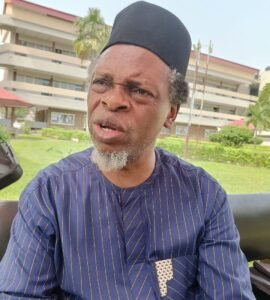
Did you find it easy relating with your coursemates who were as young as your children?
It is good to have a very strong vision; vision is long-term, while mission is short-term. The mission drives the vision. Being intentional about it that I wanted to study Sociology, I wanted to get an answer to why people behave the way they behave. So kids, ordinarily, just became part of the object of my study. If I then misbehaved at the end of the day, I would also become a misadventure in that pursuit; you want to study why people behave the way they behave and you yourself is misbehaving. You should be accommodating enough; you should be magnanimous; you should be large-hearted enough; you should anticipate what they would do; and anything you do not anticipate, you should keep quiet when it happens. You don’t take an umbrage at them. They are your children.
The great majority of them appreciated me as a father; they called me daddy. Some, insisted on being fanatically officious; they called me Mr Sanni. Even though I would find it a bit strange when an 18-year-old, 19-year-old call me like that, I will answer gladly. Even, at times, you will see some of them correcting one another, saying “no, don’t call him Mr Sanni. He is baba”.
There was a day one of them said, “even though he is a daddy, but he is not my father”. I never confronted him. At a point in time, we were even in the same group for an assignment. He knew I heard but confronting him might degenerate and even distort my mission. In the class, just typical of how kids would behave, at times, they would like to talk to their colleagues, they will talk over and above my head. I will not even behave as if I was touched, buy somebody will correct them saying “mind baba now.”
Then, at times, for group assignment, I have never liked it in my life. You know you have your own ambition. You will never know if the people you are grouped together with have an ambition as high as your own. At the end of the day, you will probably be the only one doing that work.
I remember one of those group assignments, the professor said the presenter would be randomly selected and this guy never attended any of the group discussions. At the end of the day, he was the one that picked yes to make the presentation of the work that we have toiled on. Of course, the guy presented nothing and that affected our score. I have to struggle to do a makeup and it was of the reasons I was unable to make a perfect score, 4.0.
So, for the kids, that was the way I handled them. Anything they wanted, I will make sure that I showed interest in it, once it was positive. Even the group assignments that we were talking about, some of them who were quite ambitious, it did not go down well with them that baba should be doing everything. At times, it was like ‘let us also do it. We can also do it’. So, at a point, there was an assignment that I said let me step down. But many of them were not comfortable.
What was your relationship with your lecturers?
That is a very tough one. My lecturers are scholars. There is no way you can compare them with those kids. I will divide the lecturers into three categories: one group, let us 90 per cent; another group, nine+ per cent; and the last group, infinitesimal.
I will start from the last group: one, two or three who simply could not accommodate me. I needed to manage the relationship. On such occasions, one would require a great level of humility, discipline and integrity. I will never and I never went to any lecturer to say ‘please, dash me marks’. I will be very early to your class. I will be punctual. I will not miss lectures. I will not miss assignments. I will not miss tests. But I will run after you to seek clarifications, anywhere.
When I was trying to choose my Elective Courses, I went to the Department of Economics to see if I could pick one of the courses there. Some people directed me to a lecturer. I got there; he had a visitor. I said: “Excuse me sir, I don’t know whether you can guide me as to the choice of Electives”. He fumed: “If that is what I will be sitting here doing, students would be coming to me to guide? All information is on the Notice Board. Excuse me”. The person sitting by his side felt my pain and then re-explained with a human heart: “Baba, boya ti e ba wo ibi Notice Board yen, ti e ko ba wa get e, boya ti e ba ri awon students, e le beere lowo won. (“Baba, if you can check the Notice Board, if you still don’t understand it, if you see some students, you can ask them for a guide”). I said “thank you sir” and I turned back.
If you did not ask this question now, I will not tell you. This is because that same lecturer has more than redeemed his personal character without anybody intervening. One day, he found me somewhere. I think he was even one of the orientation lecturers. He said: “I was also in this same hall, the Large Lecture Theatre, LLT, when I was in 100 Level in 1985”. And I remembered that that was when I graduated. Subsequently, we met at an occasion and he practically prostrated to greet me and I reciprocated. So, what else would I be talking about?
I think another lecturer also misunderstood me; my running after him, trying to seek clarifications and trying to build relationship was misinterpreted for patronage or looking for a favour. But I bore no grudges.
However, 90 per cent of the lecturers took me as their friend; as their brother; even some of them took me as their elder brother and till today some of them call me baba. Many of the lecturers have said to me: “You are an inspiration to us. Please, keep the flag flying. At your age, is it money you are looking for?” That majority gives me a lot of joy.
Then, the other 10 per cent, of course, I keep them at arm’s length because I don’t know what they will represent and it is better not to get into trouble. But I don’t blame them.
Can you mention the eight awards you got as the Best Graduating Student of Sociology?
Best Final Year Student with Second Class Honours, Upper (Departmental Prize); Okediji Memorial Prize, (Best Student in Sociology); Onigu Otete Annual Prize in Sociology (Best Student in Sociology); Anafi and Grace Foundation Award (A Scholarship Award to Best Student in Sociology); NISTF Prize (An Award to the Best Graduating 400 Level Student in Sociology Department); Chief Dr Paul Olajide Prize in Sociology (Best Student in Sociology); Family Club of Nigeria Prize in Sociology (Best Final Year Student in Department of Sociology); and Faculty of Social Sciences Prize for the Best Student).
Can you compare your time as an undergraduate student of Accounting and as an undergraduate student of Sociology?
The first thing was that I studied Accounting without passion; ‘just go ahead and read it’. I was just regurgitating it. At a point in time in Ife, I actually believed that I was under some spiritual influence. Historically, I lived at Room 3, Fajuyi Hall and they used to call me Kamara of Admin. I was already like a dynasty. Then, some things happened. The Bible testifies to the existence of evil. The Quran testifies to it too. Even the traditionalists testify to it. So somebody would just be deceiving himself saying that there is no such thing called evil.
I was in the mosque at Fajuyi Hall one day. This is not a case of a scene in Africa Magic. A bird flew in and landed on my head. Here was a man who was not interested in Accounting and a bird came in from nowhere and landed on his head. From then on, University of Ife now became like leprosy to me.
The moment I step into the campus, I will be sad; there will be melancholy. I wanted to wave the issue of the bird aside, but then I asked “was I the only one there and in the mosque for that matter?”; Could it have any effect on me?” I wanted to shrug it off but the reality of life did not allow me to do that. I practically lost interest.
I had to be running around, praying before I could stabilise spiritually and mentally. So, I believed that it was a revelation that I should vacate Room 3 Fajuyi Hall. I started living in the amphitheater of the Faculty of Law. I took my mattress and every other things there to live. I was also wearing white alone, with a white turban. My student-colleagues would see me and say “Maitatsine has come to Ife”. But we thank God.
The way it was with me in those days, if you want to analyse, academically, I read the books. Socially, I had no social life; no girlfriend, nothing. Spiritually, I have just described it to you now.
What I did at Ife was unlike what I experienced here in Ibadan. I purposively picked this course. I knew what I wanted. I was intentional about it. I put in my best and no bird landed on my head. I was in control and there was no sense of psychological defeat. I had a goal that I was driving at; that I must achieve this goal. My life became equated with the achievement of that goal. So, my experiences at Ife and Ibadan are two parallels.
What next after a degree in Sociology?
Professor Omobowale was the first person to ask me this question when I was putting together my undergraduate project. He fondly calls me Alhaji. He asked: “Alhaji, what next?” I said to him, “Oga, emi kan wa gba ategun nibi ni. Mo ti sere tan; mi o ni nkankan ti mo tun fe se” (Oga, I just came here to relax. I am done with the relaxation; I don’t have any other thing I want to do). But he told me: “Alhaji, with your experience, even if you open an office, you will do consultancy successfully. So, frankly, what is next”? I said “okay, maybe MSc. Sociology.” He said “What can we teach you again? But I understand that you already have one Master’s Degree”. And I told him in the affirmative. He asked in what and I told him International Management from University of Liverpool, London. He asked about my results and I told him I had eight distinctions. He said: “Alhaji, why don’t you combine that one with this BSc Sociology and there is a new course now, Ph.D Public Policy. Why don’t you go for that?” I replied, “Oga, you think I have the capacity for Ph.D?” He told me that I have the capacity, that I can do it if I just put my mind on it.
I asked him how to start. He said I should go and pick the form. I got the Master’s Degree form. I wrote the Test of English Proficiency. By God’s grace, I scored 82 and I was given admission for an MSc. With what Professor Omobowale said, how would I go about it? He told me to go and upgrade my form. I did that and applied for Ph.D Public Policy and they gave me admission. Now, I am back in UI.

